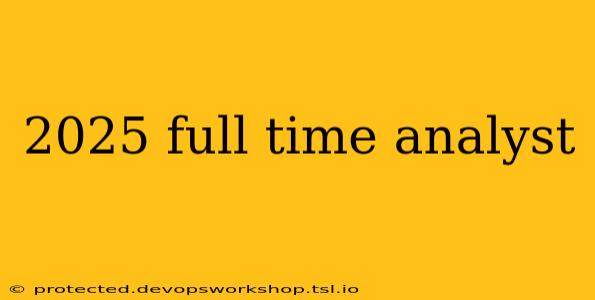Landing a Full-Time Analyst Position in 2025: Your Competitive Edge
The job market for analysts is dynamic, and securing a full-time role in 2025 requires a strategic approach. This guide outlines key strategies to enhance your candidacy and increase your chances of success. We’ll delve into essential skills, networking techniques, and the importance of showcasing your unique value proposition.
What Makes 2025 Different?
The analyst landscape is constantly evolving. Technological advancements, particularly in AI and machine learning, are reshaping the demands of the role. Companies now seek analysts with a blend of technical proficiency and strong analytical skills, coupled with excellent communication and problem-solving abilities. Adaptability and a willingness to learn new technologies are also crucial for success in 2025.
Essential Skills for 2025 Analyst Roles
Beyond the standard analytical skills, employers are increasingly seeking candidates proficient in:
- Data Visualization Tools: Tools like Tableau, Power BI, and Qlik Sense are in high demand. Mastering these tools allows you to effectively communicate complex data insights to diverse audiences.
- Programming Languages: Python and R remain highly sought-after, offering the ability to automate tasks, perform complex statistical analysis, and build predictive models. SQL is essential for database management and querying.
- AI and Machine Learning Fundamentals: While deep expertise isn't always required, a basic understanding of AI and machine learning principles is increasingly becoming a valuable asset. Familiarity with algorithms and their applications can significantly boost your candidacy.
- Cloud Computing Platforms: Experience with cloud platforms like AWS, Azure, or GCP is becoming increasingly important, especially for roles involving big data analysis.
- Business Acumen: Understanding business principles and translating data insights into actionable strategies is critical. Demonstrate your ability to connect data analysis to real-world business implications.
Crafting a Winning Resume and Cover Letter
Your resume and cover letter are your first impression. Tailor them to each specific job description, highlighting relevant skills and experiences.
- Quantifiable Achievements: Focus on quantifiable achievements rather than simply listing your responsibilities. Use numbers to demonstrate your impact. For example, instead of saying "Improved efficiency," say "Improved efficiency by 15% through process optimization."
- Keywords: Incorporate relevant keywords from the job description into your resume and cover letter. This helps Applicant Tracking Systems (ATS) identify your application.
- Storytelling: Don't just list your skills; tell a story that showcases your abilities and passion for data analysis.
Networking: Your Secret Weapon
Networking is crucial for securing a full-time analyst position.
- Online Platforms: Actively participate in relevant online communities, forums, and professional networking sites like LinkedIn. Engage in discussions and share your expertise.
- Industry Events: Attend industry conferences and workshops to connect with professionals and learn about new trends.
- Informational Interviews: Reach out to analysts working in your desired field for informational interviews. These conversations can provide valuable insights and potential leads.
Preparing for the Interview Process
The interview process can be challenging. Prepare thoroughly by practicing your answers to common interview questions and conducting thorough research on the company and the role.
- Behavioral Questions: Prepare examples that showcase your problem-solving skills, teamwork abilities, and ability to handle pressure.
- Technical Questions: Brush up on your technical skills and be prepared to answer questions related to data analysis, programming, and visualization tools.
- Case Studies: Practice solving case studies to demonstrate your analytical and problem-solving capabilities.
The Value of Continuous Learning
The field of data analysis is constantly evolving. Continuous learning is crucial for staying ahead of the curve and remaining competitive. Explore online courses, workshops, and certifications to enhance your skills and knowledge.
Conclusion:
Securing a full-time analyst position in 2025 requires a multifaceted approach. By focusing on developing in-demand skills, crafting a compelling application, networking effectively, and preparing diligently for the interview process, you can significantly increase your chances of success. Remember, continuous learning is key to navigating the ever-changing landscape of data analysis.

